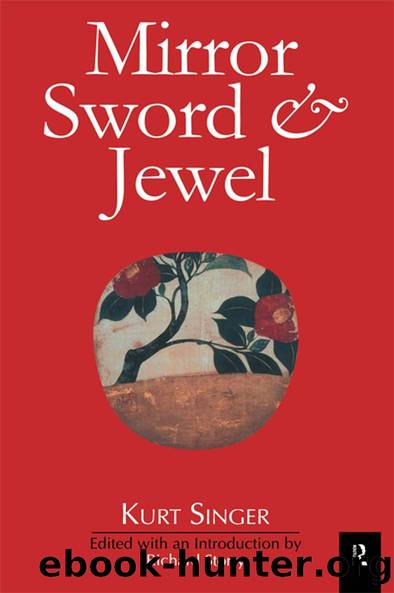Mirror, Sword and Jewel by Kurt Singer

Author:Kurt Singer [Singer, Kurt]
Language: eng
Format: epub
Tags: Social Science, Ethnic Studies, General, Regional Studies
ISBN: 9781134248384
Google: iVJHAQAAQBAJ
Publisher: Routledge
Published: 2013-10-08T04:51:00+00:00
SEQUENCES AND LAWS
The unwritten norm of a civilisation resembles a melody more than what modern physicists and jurists call a law. It is an historical growth, never identical withânor exhausted byâany cross-section made at a certain date, even if it be the culminating point of that culture. A civilisation is a fabric that extends its sway not only in space but also in time; its present cannot be understood without constant reference to its roots in the past and to its anticipations of the future. Certain products of a civilisation, poems and rituals, philosophies and technologies, may claim some kind of universal validity, in relative freedom from the limitations of space and time; but they cannot be understood if they are not first seen as children of a specific soil, of a determinate hour of history. They gain significance for other civilisations only on condition of having first served their mother civilisation, in a unique situation in which a man-creator became the founder of a spiritual race by answering a riddle of the sphinx or a voice from a burning bush. The fundamental distinction is not between societies of different ideas and aims, but between those awake at the hour of spiritual destiny, able to find their own word in answer to the call and to sustain and guard the life of this word, and those that have failed. The infant societies we call primitive have not yet found such a word. Those lingering on in stereotyped ways after the word had exhausted its inner force may be called reverberative; to this type belong the Egyptian civilisation after the end of the Ramessides, Chinese civilisation after the Han dynasty, and Indian civilisation after King Asoka.
Finding a new Word and keeping it alive in ever-changing forms is the work of the spirit and therefore unpredictable. A civilisation, however, is the process in which the spirit compels and persuades matter to carry its imprint in the shape of enduring configurations (Gestalten, Gestaltungen), and as this matterâthe basic structure of man, his mind, and his geographical environmentâis largely homogenous, it may be expected that the emergence, transformation, and decay of such patterns should follow laws comparable with those ruling other organic units.
Every mature civilisation conceives of itself in terms of a personality, thinking back to its childhood; dwelling on its ripening into manhood; fixing a culminating point, the âgreat noonâ of its life; learning, reluctantly, to know when the full development of its potentialities marks the beginning of descent, when growing clarity and power must be purchased with lessening creative powers; finally deciding, after a period of intensified strife and mental agony, to desire nothing better than stability, quiet, order and content, while it surrenders to others the Promethean task of subduing chaos into new form.
Within the framework created by such final structures, of which the Imperium Romanum after Augustus, the Han Empire of the Chinese, and the New Empire of Egypt, are the great examples, a reverberating civilisation may uphold the life
Download
This site does not store any files on its server. We only index and link to content provided by other sites. Please contact the content providers to delete copyright contents if any and email us, we'll remove relevant links or contents immediately.
Spare by Prince Harry The Duke of Sussex(4188)
Machine Learning at Scale with H2O by Gregory Keys | David Whiting(2263)
Fairy Tale by Stephen King(2058)
Will by Will Smith(2032)
Hooked: A Dark, Contemporary Romance (Never After Series) by Emily McIntire(1932)
Rationality by Steven Pinker(1760)
The Bullet Journal Method by Ryder Carroll(1493)
The Becoming by Nora Roberts(1323)
Friends, Lovers, and the Big Terrible Thing by Matthew Perry(1321)
A Short History of War by Jeremy Black(1295)
HBR's 10 Must Reads 2022 by Harvard Business Review(1251)
The Strength In Our Scars by Bianca Sparacino(1234)
Can't Hurt Me: Master Your Mind and Defy the Odds - Clean Edition by David Goggins(1218)
515945210 by Unknown(1205)
Fear No Evil by James Patterson(1105)
Love on the Brain by Ali Hazelwood(1088)
This Family Does It by Kevin Sellers(1079)
Bewilderment by Richard Powers(1077)
443319537 by Unknown(1069)
